- Home
- Thich Nhat Hanh
How to Love Page 2
How to Love Read online
Page 2
LOVING MINDFULLY
“Love” is a beautiful word, and we have to restore its meaning. When we say, “I love hamburgers,” we spoil the word. We have to make the effort to heal words by using them properly and carefully. True love includes a sense of responsibility and accepting the other person as she is, with all her strengths and weaknesses. If you only like the best things in a person, that is not love. You have to accept her weaknesses and bring your patience, understanding, and energy to help her transform. This kind of love brings protection and safety.
NONDISCRIMINATION
In true love, there’s no more separation or discrimination. His happiness is your happiness. Your suffering is his suffering. You can no longer say, “That’s your problem.” In true love, both happiness and suffering are no longer individual matters. You are him, and he is you. In a good relationship we are like two fingers of the same hand. The little finger doesn’t suffer from an inferiority complex and say, “I’m so small. I wish I were as big as the thumb.” The thumb doesn’t have a superiority complex, saying, “I’m more important. I’m the big brother of all the fingers; you have to obey me.” Instead, there’s a perfect collaboration between them.
ASKING FOR HELP
When you suffer, you may want to go to your room, lock the door, and cry. The person who hurt you is the last person you want to see. Even if he tries to approach you, you may still be very angry. But to get relief, you have to go to the person you love, the one who just hurt you very deeply, and ask for help. Become yourself one hundred percent. Open your mouth and say with all your heart and with all your concentration that you suffer and you need help.
THREE HELPFUL SENTENCES
It’s not healthy to keep anger inside for too long. If you’re too upset to speak calmly, you can write a note and put it where the other person will see it. Here are three sentences that may help. First: “My dear, I am suffering, I am angry, and I want you to know it.” The second is: “I am doing my best.” This means you are practicing mindful breathing and walking, and you are refraining from doing or saying anything out of anger. The third is: “Please help me.” Memorize these sentences. Or write them on a small piece of paper, the size of a credit card, and put it in your wallet. Then when you’re angry, you can take it out, and you will know exactly what to do.
ARE YOU SURE?
Other people’s actions are the result of their own pain and not the result of any intention to hurt you. A wrong perception can be the cause of a lot of suffering. This is why, whenever we have a perception, we have to ask ourselves if our perception is right. When we stand with friends looking at the setting sun, we’re sure the sun has not set quite yet. But a scientist might tell us that the sun we’re seeing is only the image of the sun of eight minutes ago. We are subject to thousands of wrong perceptions like this in our daily lives. The next time you suffer, and you believe that your suffering has been caused by the person you love the most, ask your loved one for help.
PRIDE
Often, our pride stands in the way of our asking for help. In true love there is no place for pride. To love each other means to trust each other. If you don’t tell the person you love of your suffering, it means you don’t love this person enough to trust her. You have to realize that this person is the best person to help you. We need to be able to get help from the person we love.
REDISCOVERING APPRECIATION
When a loved one is suffering a lot, he or she doesn’t have enough energy to embrace you and help you to suffer less. So it’s natural that you become disappointed. You think that the other person’s presence is no longer helpful to you. You may even wonder if you love this person anymore. If you’re patient and you practice taking care of yourself and the other person, you may have a chance to discover that the elements of goodness and beauty in the person you love are still there. Taking care of yourself, you can support your loved one and reestablish the joy in your relationship.
A DEEP THIRST
Sometimes we feel empty; we feel a vacuum, a great lack of something. We don’t know the cause; it’s very vague, but that feeling of being empty inside is very strong. We expect and hope for something much better so we’ll feel less alone, less empty. The desire to understand ourselves and to understand life is a deep thirst. There’s also the deep thirst to be loved and to love. We are ready to love and be loved. It’s very natural. But because we feel empty, we try to find an object of our love. Sometimes we haven’t had the time to understand ourselves, yet we’ve already found the object of our love. When we realize that all our hopes and expectations of course can’t be fulfilled by that person, we continue to feel empty. You want to find something, but you don’t know what to search for. In everyone there’s a continuous desire and expectation; deep inside, you still expect something better to happen. That is why you check your email many times a day!
A POT IN SEARCH OF A LID
Very often we feel like a pot without a lid. We believe that our lid is somewhere in the world and that if we look very hard, we’ll find the right lid to cover our pot. The feeling of emptiness is always there inside us. When we contemplate the other person, sometimes we think we see what we feel we lack. We think we need someone else to lean on, to take refuge in, and to diminish our suffering. We want to be the object of another person’s attention and contemplation. We want someone who will look at us and embrace our feeling of emptiness and suffering with his energy of mindfulness. Soon we become addicted to that kind of energy; we think that without that attention, we can’t live. It helps us feel less empty and helps us forget the block of suffering inside. When we ourselves can’t generate the energy to take care of ourselves, we think we need the energy of someone else. We focus on the need and the lack rather than generating the energy of mindfulness, concentration, and insight that can heal our suffering and help the other person as well.
BEFORE COMMITTING TO ANOTHER
There was a couple who were about to get married in Plum Village, the practice center where I live. They wanted to see me before the wedding ceremony and I received them in my hut. They said, “Thay, there are only twenty-four hours left before our wedding. What do you think that we can do to prepare for our married life to be successful?” I said, “The most important thing for you to do is to look deeply into yourself, to see if there is something that is still an obstacle for you. Is there anyone with whom you haven’t reconciled? Is there anything within you that you haven’t reconciled with?” Reconciliation can also be with your own self. If you don’t reconcile with yourself, happiness with another person is impossible.
RECONCILING FROM A DISTANCE
Even if the person with whom you need to reconcile is very far away, you can still do the work of reconciliation now. What is important is to reconcile within your own heart and mind. If reconciliation is done within, that is enough. Because the effect of that reconciliation will be felt everywhere later on. Even if the person you want to reconcile with refuses to respond, or even if she’s already dead, reconciliation is still possible. Reconciliation means to work it out within yourself so that peace can be restored. Reconcile with yourself for the sake of the world, for the sake of all living beings. Your peace and serenity are crucial for all of us.
STARTING A FAMILY
Before having a child, it would be wonderful if people would take a year to look deeply into themselves, to practice loving speech and deep listening, and to learn the other practices that will help them enjoy themselves and their children more. Bringing a new life into the world is a serious matter. Taking a year for introspection and preparation doesn’t seem too much. Doctors and therapists spend up to ten years to get a license. But anyone can become a parent without any training or preparation. Parents can learn how to sow seeds of happiness, peace, and joy in the new child.
THE PRACTICE OF METTA
To love is, first of all, to accept ourselves as we actually are. The first practice of love is to know oneself. The Pali word metta means “
loving kindness.” When we practice Metta Meditation, we see the conditions that have caused us to be the way we are; this makes it easy for us to accept ourselves, including our suffering and our happiness. When we practice Metta Meditation, we touch our deepest aspirations. But the willingness and aspiration to love is not yet love. We have to look deeply, with all our being, in order to understand the object of our meditation. The practice of love meditation is not autosuggestion. We have to look deeply at our body, feelings, perceptions, mental formations, and consciousness. We can observe how much peace, happiness, and lightness we already have. We can notice whether we are anxious about accidents or misfortunes, and how much anger, irritation, fear, anxiety, or worry are still in us. As we become aware of the feelings in us, our self-understanding will deepen. We will see how our fears and lack of peace contribute to our unhappiness, and we will see the value of loving ourselves and cultivating a heart of compassion. Love will enter our thoughts, words, and actions.
DIGGING DEEP
Practicing loving kindness meditation is like digging deep into the ground until we reach the purest water. We look deeply into ourselves until insight arises and our love flows to the surface. Joy and happiness radiate from our eyes, and everyone around us benefits from our smile and our presence. If we take good care of ourselves, we help everyone. We stop being a source of suffering to the world, and we become a reservoir of joy and freshness. Here and there are people who know how to take good care of themselves, who live joyfully and happily. They are our strongest support. Whatever they do, they do for everyone.
MAKING MISTAKES
Since we’re human beings, we make mistakes. We cause others to suffer. We hurt our loved ones, and we feel regret. But without making mistakes, there is no way to learn. If you can learn from your mistakes, then you have already transformed garbage into flowers. Very often, our mistakes come from our unskillfulness, and not because we want to harm one another. I think of our behavior in terms of being more or less skillful rather than in terms of good and bad. If you are skillful, you can avoid making yourself suffer and the other person suffer. If there’s something you want to tell the other person, then you have to say it, but do so skillfully, in a way that leads to less rather than more suffering.
GOODWILL IS NOT ENOUGH
Your good intentions are not enough; you have to be artful. We may be filled with goodwill; we may be motivated by the desire to make the other person happy; but out of our clumsiness, we make them unhappy. Walking, eating, breathing, talking, and working are all opportunities to practice creating happiness inside you and around you. Mindful living is an art, and each of us has to train to be an artist.
FINDING HOME
Every one of us is trying to find our true home. Some of us are still searching. Our true home is inside, but it’s also in our loved ones around us. When you’re in a loving relationship, you and the other person can be a true home for each other. In Vietnamese, the nickname for a person’s life partner is “my home.” So, for example, if a man is asked, “Where is your wife?” he might say, “My home is now at the post office.” If a guest said to the woman, “That meal was delicious; who cooked it?” she might answer, “My home prepared the meal,” meaning “My husband cooked the dinner.”
OPENING THE DOOR
Once you know how to come home to yourself, then you can open your home to other people, because you have something to offer. The other person has to do exactly the same thing if they are to have something to offer you. Otherwise, they will have nothing to share but their loneliness, sickness, and suffering. This can’t help heal you at all. The other person has to heal themselves and get warm inside, so that they will feel better, at ease, and can share their home with you.
HOLY INTIMACY
Sexual intimacy can be a beautiful thing if there is mindfulness, concentration, insight, mutual understanding, and love. Otherwise it will be very destructive. When the emotional, spiritual, and physical are in harmony, then intimacy can be very holy. It is easier to practice mindful intimacy as a monk than to practice as a layperson, because it’s easier to refrain from sexual activity altogether than to maintain a harmonious sexual relationship. Physical intimacy should take place only when there is mutual understanding and love.
CHANNELING SEXUAL ENERGY
The Buddha was thirty-five, still very young, when he became enlightened. At this age we have a lot of sexual energy. It’s wonderful if we can use this energy for the benefit of all beings, just as the Buddha did. The young monastics in our practice center spend a lot of time chopping wood, gardening, cooking, doing sitting meditation, and practicing walking meditation. They organize retreats, take care of their brothers and sisters, and of the friends who come from far away to spend time at our center and practice with us. They are using their energy in physical ways and living a fulfilling life. This helps them notice and be aware, without judgment, of sexual energy and learn to handle it well.
A STRONG ASPIRATION
If you have a deep aspiration, a goal for your life, then your loving of others is part of this aspiration and not a distraction from it. If you and your partner both want to do things to relieve the suffering in this world, then your love for each other is connected to your love for others, and it expands exponentially to cover the whole world.
WHAT LOVE NEEDS TO SURVIVE
The Buddha said that nothing survives without food, including love. If you don’t know how to nourish and feed your love, it will die. If we know how to feed our love every day it will stay for a long time. One way we nourish our love is by being conscious of what we consume. Many of us think of our daily nourishment only in terms of what we eat. But in fact, there are four kinds of food that we consume every day. They are: edible food (what we put in our mouths to nourish our bodies), sensory food (what we smell, hear, taste, feel, and touch), volition (the motivation and intention that fuels us), and consciousness (this includes our individual consciousness, the collective consciousness, and our environment).
NOURISHING OUR LOVE WITH EDIBLE FOOD
The first source of nourishment is edible food. If we eat with moderation, eating only the food we need and eating the foods that help our bodies to be strong and healthy, then we’re showing love and respect for our bodies and for the Earth. If we don’t eat healthy foods and don’t treat our own bodies with respect, then how can we respect other people’s bodies and the body of the Earth itself?
SENSORY FOOD
The second source of nourishment is sensory impressions, what we consume with our eyes, ears, nose, tongue, body, and mind. When we read a magazine, we consume. When we watch a television program, we consume. Whatever we consume affects our body and mind. If we consume toxic magazine articles, movies, or video games, they will feed our craving, our anger, and our fear. If we set aside time each day to be in a peaceful environment, to walk in nature, or even just to look at a flower or the sky, then that beauty will penetrate us and feed our love and our joy.
NOURISHING YOUR DEEPEST DESIRE
The third nutriment is volition. This is your desire, your hope, your aspiration. It’s the energy that keeps you alive. You want to be someone. You want to do something with your life. If you’re motivated by compassion and love, your volition will give you the energy and direction to grow and become even more loving and compassionate. However, if your desire is to possess or to win at all costs, this kind of volition is toxic and will not help your love to grow. You can practice developing a strong and positive volition. You can even put your commitment in words, such as: “I vow to develop understanding and compassion in me, so I can become an instrument of peace and love, to help society and the world.” This kind of intention is based in our deepest aspiration.
NOURISHING CONSCIOUSNESS
The fourth source of nourishment is collective consciousness and individual consciousness. Our individual consciousness is influenced by the collective consciousness of our environment. We absorb and reflect what is around us. If
we live in a place where people are angry and violent, then eventually we’ll become like them. If we live in a family or community where there’s a culture of being understanding and compassionate with each other, we’ll naturally be more peaceful and loving. Children growing up in such an environment will learn to be caring and kind.
IMMEASURABLE MINDS
Loving kindness, compassion, joy, and equanimity are described as unlimited states of mind because they continue to grow and they cannot be measured. The more you practice, the more you see your love growing and growing until there is no limit. The more you practice compassion, the more it grows. The more you cultivate joy, the more joy you will feel and be able to share. The more you understand, the more you love; the more you love, the more you understand. They are two sides of one reality. The mind of love and the mind of understanding are the same.
THE BEAUTY OF THE BODY
The human body is one of the most beautiful things that we can see. We need to practice treating such beauty with reverence. Perhaps we’re afraid to contemplate beauty and that’s why we don’t treat our bodies and the bodies of others with respect.

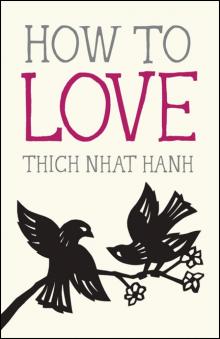 How to Love
How to Love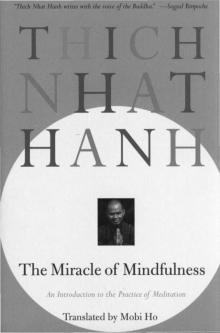 The Miracle of Mindfulness
The Miracle of Mindfulness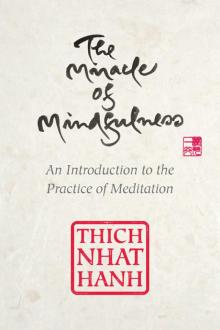 The Miracle of Mindfulness (Gift Edition)
The Miracle of Mindfulness (Gift Edition)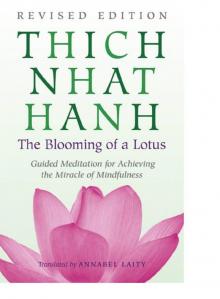 The Blooming of a Lotus
The Blooming of a Lotus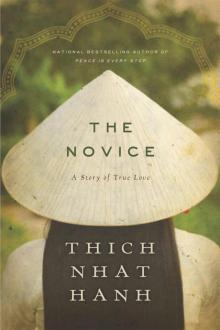 The Novice
The Novice